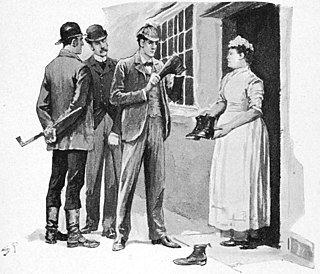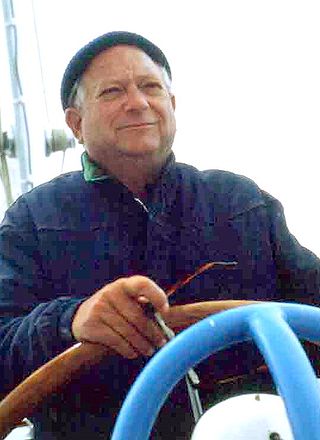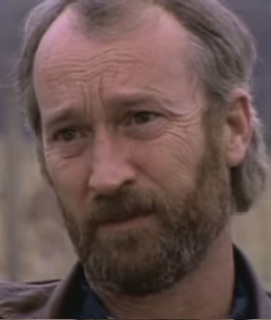Related Research Articles

Detective fiction is a subgenre of crime fiction and mystery fiction in which an investigator or a detective—whether professional, amateur or retired—investigates a crime, often murder. The detective genre began around the same time as speculative fiction and other genre fiction in the mid-nineteenth century and has remained extremely popular, particularly in novels. Some of the most famous heroes of detective fiction include C. Auguste Dupin, Sherlock Holmes, Kogoro Akechi, and Hercule Poirot. Juvenile stories featuring The Hardy Boys, Nancy Drew, and The Boxcar Children have also remained in print for several decades.

Horror is a genre of speculative fiction that is intended to disturb, frighten, or scare. Horror is often divided into the sub-genres of psychological horror and supernatural horror, which are in the realm of speculative fiction. Literary historian J. A. Cuddon, in 1984, defined the horror story as "a piece of fiction in prose of variable length ... which shocks, or even frightens the reader, or perhaps induces a feeling of repulsion or loathing". Horror intends to create an eerie and frightening atmosphere for the reader. Often the central menace of a work of horror fiction can be interpreted as a metaphor for larger fears of a society.

Sword and sorcery (S&S), or heroic fantasy, is a subgenre of fantasy characterized by sword-wielding heroes engaged in exciting and violent adventures. Elements of romance, magic, and the supernatural are also often present. Unlike works of high fantasy, the tales, though dramatic, focus on personal battles rather than world-endangering matters. The genre originated from the early-1930s works of Robert E. Howard. While there is a chance example from 1953, Fritz Leiber re-coined the term "sword and sorcery" in the 6 April 1961 issue of the fantasy fanzine Ancalagon, to describe Howard and the stories that were influenced by his works. In parallel with "sword and sorcery", the term "heroic fantasy" is used, although it is a more loosely defined genre.

John Holbrook Vance was an American mystery, fantasy, and science fiction writer. Though most of his work has been published under the name Jack Vance, he also wrote several mystery novels under pen names, including Ellery Queen.

Crime fiction, detective story, murder mystery, mystery novel, and police novel are terms used to describe narratives that centre on criminal acts and especially on the investigation, either by an amateur or a professional detective, of a crime, often a murder. Most crime drama focuses on criminal investigation and does not feature the courtroom. Suspense and mystery are key elements that are nearly ubiquitous to the genre.
Magical realism, magic realism, or marvelous realism is a style or genre of fiction and art that presents a realistic view of the world while incorporating magical elements, often blurring the lines between speculation and reality. Magical realism is the most commonly used of the three terms and refers to literature in particular. Magic realism often refers to literature in particular, with magical or supernatural phenomena presented in an otherwise real-world or mundane setting, commonly found in novels and dramatic performances. In his article "Magical Realism in Spanish American Literature", Luis Leal explains the difference between magic literature and magical realism, stating that, "Magical realism is not magic literature either. Its aim, unlike that of magic, is to express emotions, not to evoke them." Despite including certain magic elements, it is generally considered to be a different genre from fantasy because magical realism uses a substantial amount of realistic detail and employs magical elements to make a point about reality, while fantasy stories are often separated from reality. The two are also distinguished in that magic realism is closer to literary fiction than to fantasy, which is instead a type of genre fiction. Magical realism is often seen as an amalgamation of real and magical elements that produces a more inclusive writing form than either literary realism or fantasy.

Mystery is a fiction genre where the nature of an event, usually a murder or other crime, remains mysterious until the end of the story. Often within a closed circle of suspects, each suspect is usually provided with a credible motive and a reasonable opportunity for committing the crime. The central character is often a detective, who eventually solves the mystery by logical deduction from facts presented to the reader. Some mystery books are non-fiction. Mystery fiction can be detective stories in which the emphasis is on the puzzle or suspense element and its logical solution such as a whodunit. Mystery fiction can be contrasted with hardboiled detective stories, which focus on action and gritty realism.
Genre fiction, also known as formula fiction or popular fiction, is a term used in the book-trade for fictional works written with the intent of fitting into a specific literary genre in order to appeal to readers and fans already familiar with that genre.
Reginald Charles Hill FRSL was an English crime writer and the winner in 1995 of the Crime Writers' Association Cartier Diamond Dagger for Lifetime Achievement. He was inducted into the prestigious Detection Club in 1978.
A hybrid genre is a literary or film genre that blends themes and elements from two or more different genres. Works in hybrid genres are also referred to as cross-genre, multi-genre, mixed genre, or fusion genre. The Dictionary of Media and Communication describes hybrid genre as "the combination of two or more genres", which may combine elements of more than one genre and/or which may "cut across categories such as fact and fiction". Some such sub-genres have acquired their own specialised names, such as comedy drama ("dramedy"), romantic comedy ("rom-com"), horror Western, and docudrama.

The canon of a work of fiction is "the body of works taking place in a particular fictional world that are widely considered to be official or authoritative; [especially] those created by the original author or developer of the world". Canon is contrasted with, or used as the basis for, works of fan fiction and other derivative works.
Literary fiction, mainstream fiction, non-genre fiction, serious fiction, high literature, artistic literature, and sometimes just literature, are labels that, in the book trade, refer to market novels that do not fit neatly into an established genre or, otherwise, refer to novels that are character-driven rather than plot-driven, examine the human condition, use language in an experimental or poetic fashion, or are simply considered serious art.

William Larry Brown was an American novelist, non-fiction, and short story writer. He received numerous awards during his lifetime, including the Mississippi Institute of Arts and Letters award for fiction, the Lila Wallace-Reader's Digest Award, and Mississippi's Governor's Award For Excellence in the Arts. Brown was also the first two-time winner of the Southern Book Award for Fiction.

Joe Richard Lansdale is an American writer and martial arts instructor. A prose writer in a variety of genres, including Western, horror, science fiction, mystery, and suspense, he has also written comic books and screenplays. Several of his novels have been adapted for film and television. He is the winner of the British Fantasy Award, the American Horror Award, the Edgar Award, and eleven Bram Stoker Awards.

Jerome Charyn is an American writer. With nearly 50 published works over a 50-year span, Charyn has a long-standing reputation as an inventive and prolific chronicler of real and imagined American life, writing in multiple genres.
The non-fiction novel is a literary genre that, broadly speaking, depicts non-fictional elements, such as real historical figures and actual events, woven together with fictitious conversations and uses the storytelling techniques of fiction. The non-fiction novel is an otherwise loosely defined and flexible genre. The genre is sometimes referred to using the slang term "faction", a portmanteau of the words fact and fiction.
A novel is an extended work of narrative fiction usually written in prose and published as a book. The English word to describe such a work derives from the Italian: novella for "new", "news", or "short story ", itself from the Latin: novella, a singular noun use of the neuter plural of novellus, diminutive of novus, meaning "new". According to Margaret Doody, the novel has "a continuous and comprehensive history of about two thousand years", with its origins in the Ancient Greek and Roman novel, Medieval Chivalric romance, and in the tradition of the Italian Renaissance novella. The ancient romance form was revived by Romanticism, in the historical romances of Walter Scott and the Gothic novel. Some novelists, including Nathaniel Hawthorne, Herman Melville, Ann Radcliffe, and John Cowper Powys, preferred the term "romance". Such "romances" should not be confused with the genre fiction romance novel, which focuses on romantic love. M. H. Abrams and Walter Scott have argued that a novel is a fiction narrative that displays a realistic depiction of the state of a society, while the romance encompasses any fictitious narrative that emphasizes marvellous or uncommon incidents. Works of fiction that include marvellous or uncommon incidents are also novels, including Mary Shelley's Frankenstein, J. R. R. Tolkien's The Lord of the Rings, and Harper Lee's To Kill a Mockingbird.

A novelist is an author or writer of novels, though often novelists also write in other genres of both fiction and non-fiction. Some novelists are professional novelists, thus make a living writing novels and other fiction, while others aspire to support themselves in this way or write as an avocation. Most novelists struggle to have their debut novel published, but once published they often continue to be published, although very few become literary celebrities, thus gaining prestige or a considerable income from their work.

The following outline is provided as an overview of and topical guide to fantasy:
References
- ↑ "Fiction Book Review: EATING MAMMALS by John Barlow, Author . Harper Perennial $12.95 (272p) ISBN 978-0-06-059175-5". PublishersWeekly.com. Retrieved 12 November 2020.
- ↑ "HQ signs 'gritty' Leeds-based crime from Barlow | The Bookseller". www.thebookseller.com. Retrieved 12 November 2020.
- ↑ Breneman, David; Yakoboski, Paul (2011). Smart Leadership for Higher Education in Difficult Times. doi:10.4337/9781849809610. ISBN 9781849809610.